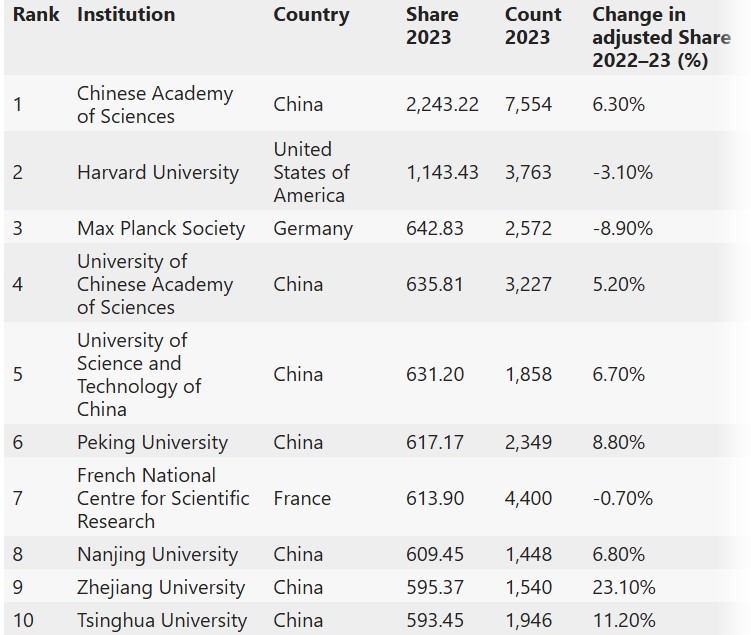In the field of global scientific research, the outstanding performance of Chinese scientific research institutions has become a phenomenon that cannot be ignored. The Nature Index 2024 Research Leaders (formerly known as the Nature Index Annual List) was released, and the Chinese Academy of Sciences continued to rank first in the world, which is the 12th consecutive year that the Chinese Academy of Sciences has ranked first in the nature index in the world. At the same time, the University of Chinese Academy of Sciences and the University of Science and Technology of China rose to fourth and fifth places in the world. This achievement is not only a symbol of China's scientific research strength, but also a significant symbol of China's rise in global scientific and technological competition.
Global recognition of China's scientific research strength
According to the latest Nature Index data, the leading position of the Chinese Academy of Sciences among global scientific research institutions has been further consolidated. It ranks first in the world in the three disciplines of chemistry, physical sciences, and earth and environmental sciences, and has also made significant progress in the field of life sciences, ranking second in the world. This achievement is due to the continuous investment and policy support of the Chinese government in scientific research, as well as the unremitting efforts and innovation of scientific researchers.
According to the latest list, the top 10 countries with high-quality research output are China, the United States, Germany, the United Kingdom, Japan, France, Canada, South Korea, India and Switzerland.

Figure: 2024 Nature Index Research Leaders Rankings, also known as the Nature Index Annual Rankings
Complex reaction of Western countries
Western countries have had mixed reactions to the rapid rise of Chinese research. On the one hand, China's scientific research achievements have been widely recognized by the international community, and many Western scientific research institutions and scholars have increasingly cooperated with China in scientific research, jointly promoting the development of global science and technology. On the other hand, some Western countries have also expressed concern about the growth of China's scientific research strength, fearing that it may pose a challenge to the existing international scientific research order.
International cooperation and exchanges in scientific research in China
The international cooperation and exchange of the Chinese Academy of Sciences is one of the important factors for the improvement of its scientific research strength. Through cooperation with international scientific research institutions, the Chinese Academy of Sciences not only introduces advanced scientific research concepts and technologies, but also provides a broader international perspective for Chinese researchers. This open attitude towards scientific research will help Chinese scientific research institutions gain more voice and influence in the global scientific research field.
Independent innovation and achievement transformation of China's scientific research
The scientific research achievements of the Chinese Academy of Sciences are not only reflected in the high-quality publication of papers, but also in the innovative application and industrialization of scientific research achievements. Many scientific research achievements have been successfully transformed into practical applications, promoting technological progress and product innovation in related industries, and making important contributions to the economic development of China and even the world.
The Chinese Academy of Sciences has ranked first in the world in the Nature Index for 12 consecutive years, which is a significant symbol of China's scientific research strength and innovation ability. Western countries have mixed views on this, ranging from recognition and cooperation, to concerns and challenges. However, it is undeniable that China's scientific achievements have had a profound impact on a global scale.
Looking ahead, Chinese scientific research institutions should continue to strengthen international cooperation, promote the transformation of scientific research achievements, and contribute more Chinese wisdom to the sustainable development of the country and the progress of human society. At the same time, we should also actively respond to the concerns of the international community, enhance mutual understanding and trust through open and transparent scientific research exchanges, and jointly promote the prosperity and development of global science and technology. With the further consolidation of China's position in the global scientific research field, we have reason to believe that China will continue to make greater contributions to global scientific and technological progress.






